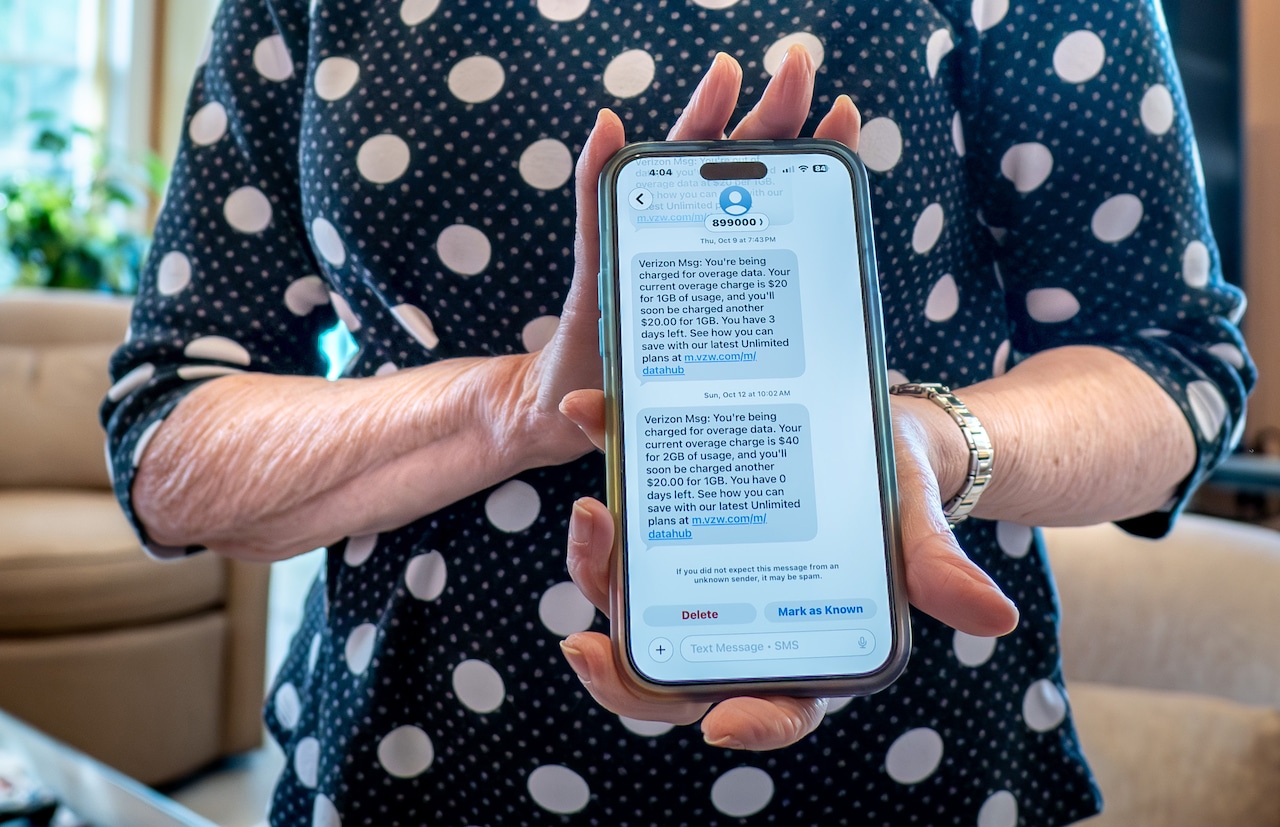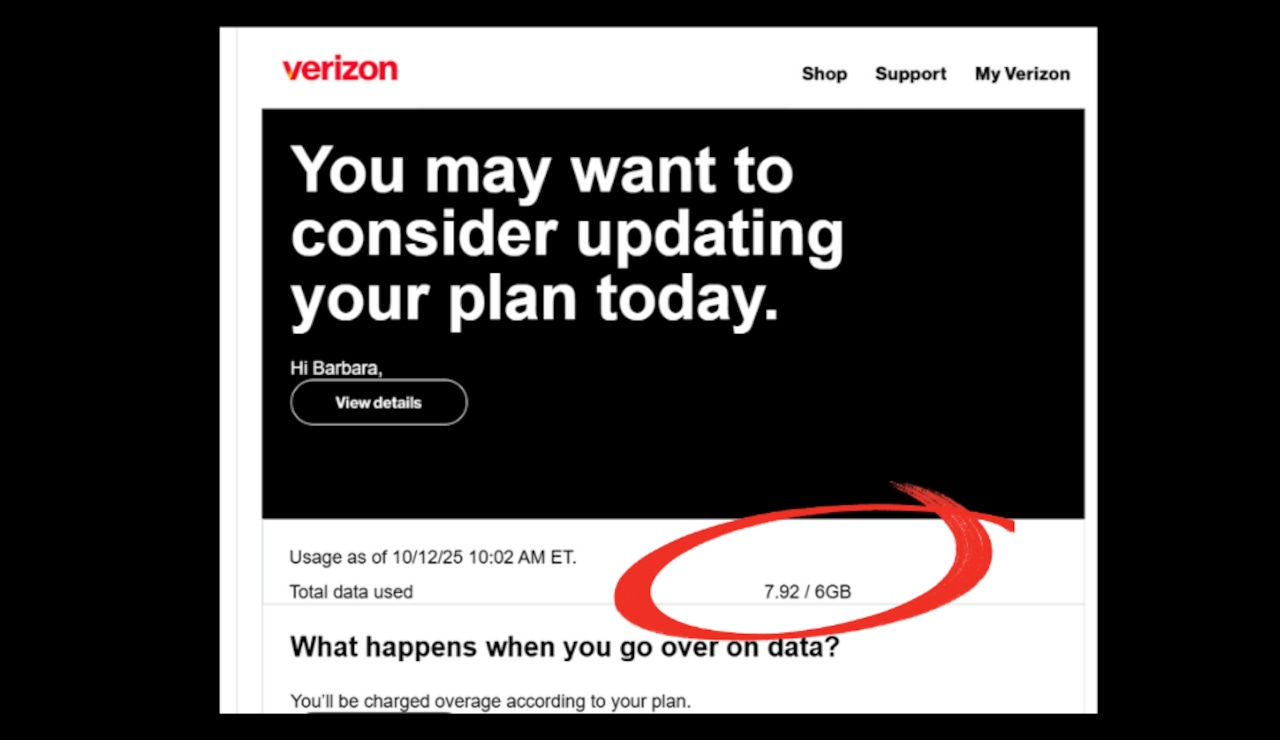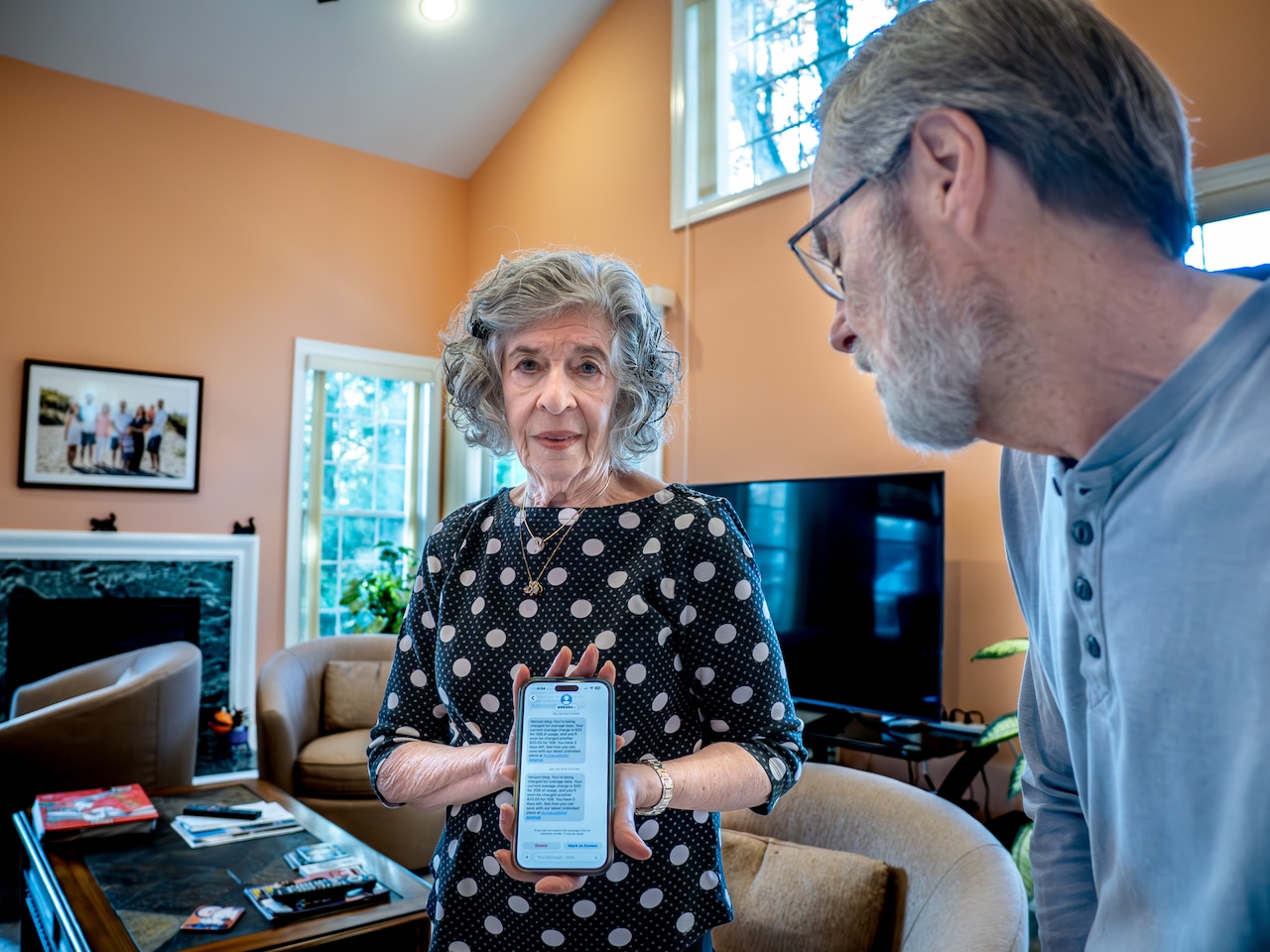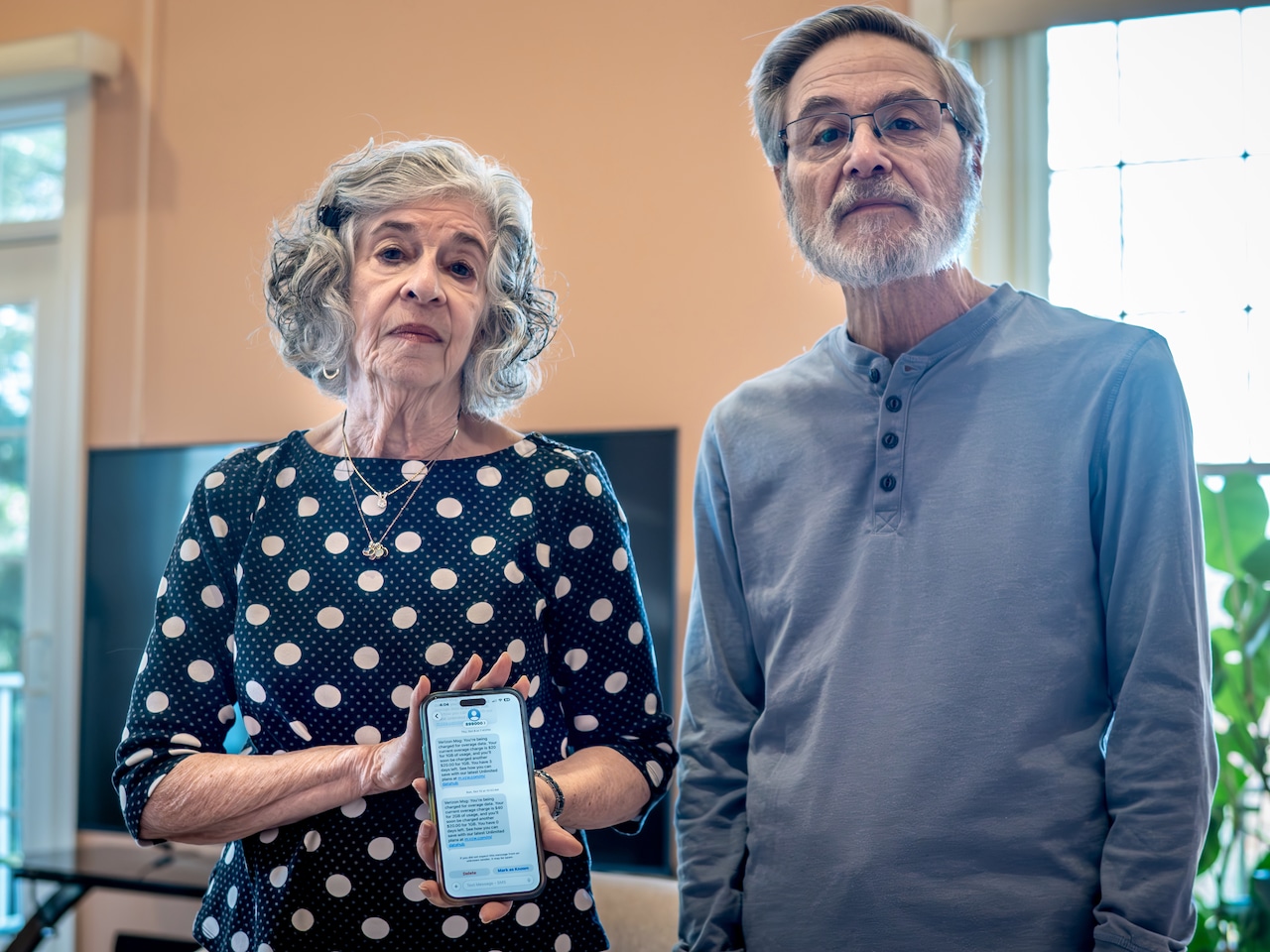One of the most important rules of cell phone use?
Don’t go over your data limit.
Overages can lead to a more expensive bill than you’d been planning for.
Indeed, anyone who has a cell phone-armed teen has probably warned about watching data use when they’re not on Wi-Fi — something that can be a challenge in today’s world of TikTok videos, Instagram reels and music streaming that incessantly eat up data.
But Steve and Barbara Stern, who have used Verizon for decades, aren’t teens.
“(Verizon) cannot explain why my wife’s monthly data use is consistently much higher than mine — and sometimes even my millennial son’s — despite the fact that all music streaming and 95% of navigation are on my phone, not hers,” Steve Stern said. “In point of fact, she has very little non-Wi-Fi usage.”
He said he and his wife are retired and mostly on Wi-Fi from home. When they go out, Steve Stern’s phone does the hard data work.
“Her usage should be the lowest by far,” Steve Stern said. “She does not stream music and uses maps only when traveling locally by herself.”
But their complaint goes beyond unexplained data use.
Their current Verizon plan gives them 6 gigs of data shared across their three phone lines. If they come close to using up their allotment, Verizon sends a warning text that they’ll be charged $20 for each additional gig of data they use.
But the couple alleges that Verizon’s warnings about their data have been way off base — even taking into account Barbara Stern’s mystery high data use — and the messages have been something of a false alarm. And now, they said, they have a sneaking suspicion that the inaccurate alerts are done intentionally so the couple drops their grandfathered plan and switches to a new one.
It’s a hefty accusation.
But is it a fair one?
Are the texts well-intended warnings? Or are they part of a larger effort to upsell, to get the couple off a generous, grandfathered plan that Verizon no longer offers?
Let’s take a closer look.
‘NOT TRUE’
The Sterns said they get warnings every month about how much data they’ve used and how many days are left for their monthly allotment.
But in October, they’d had enough with what they said were consistent inaccuracies.
They received warnings they were nearing their limit on Oct. 2 and Oct. 4. Then on Oct. 7, a text said they were being charged $20 for an extra gig. Two days later, a text warned they’d soon be charged even more.
“In actuality, we were far from that,” Steve Stern said. “On Oct.12, we were told that we had now gone over by 2 gigabytes, which was not true.”
It’s important to understand the exact language used in the message.
 Barbara Stern shows a message from Verizon saying they were using too much data. Stern and her husband alleged Verizon’s messages about data were highly inaccurate. Ian Peters | For NJ Advance Medi
Barbara Stern shows a message from Verizon saying they were using too much data. Stern and her husband alleged Verizon’s messages about data were highly inaccurate. Ian Peters | For NJ Advance Medi
The Oct. 12 message said: “You’re being charged for overage data. Your current overage charge is $40 for 2GB of usage, and you’ll soon be charged another $20 for 1GB.”
Then the text offers a link to “see how you can save” with Verizon’s unlimited data plans.
The same day, they also received an email that estimated their monthly data usage at 7.92 gigs and suggested they upgrade their plan.
 Steve and Barbara Stern received this email from Verizon saying their data use was much higher than it actually was. (Red circle added for emphasis.)Courtesy Steve and Barbara Stern/Canva illustration for NJ.com
Steve and Barbara Stern received this email from Verizon saying their data use was much higher than it actually was. (Red circle added for emphasis.)Courtesy Steve and Barbara Stern/Canva illustration for NJ.com
But that turned out to be wrong.
“In reality, usage was 6.65 gigs,” Stern said, citing his bill. “That’s a heck of an estimate — 19% higher than the reality.”
They called Verizon customer service.
“The rep made a big deal about how much money we’d save by switching plans. Not true,” Steve Stern said. “Only after I drilled down did he admit that the plan he was describing was 4G. To keep our current 5G, the cost would actually be $40 more.”
Without getting too technical, 5G is a faster speed than 4G.
They also asked if the price offered was for a limited time or forever.
“He said there was no limit as long as we did not make changes. Not true,” Steve Stern said. “They’re offering just 3-year price fixes.” He checked the website to make sure.
Then there’s still the unexplained higher usage on Barbara Stern’s line.
He said the Verizon rep wasn’t helpful there, but was “very obviously much more interested in moving us out of our grandfathered plan into an unlimited plan, which he pushed again and again.”
Stern said they’d take her phone to an Apple store to see if anyone could diagnose the problem.
The couple said more than the money aspect of what happened, they were most bothered by the “dishonesty” of the text messages and email and the “lack of honesty” from the rep in their phone call about a new plan.
The Sterns asked if Bamboozled could make sense of it all.
DATA DILEMMA
Cell phones often have apps that run in the background, gobbling up data and using up your battery.
They operate even when you’re not actively using the apps.
Perhaps you get alerts from a news or weather app. Or Facebook or Instagram notifications. Or your email may constantly “fetch” new messages.
Every phone is different, but you can generally go to “settings” to see what apps are working in the background and how much data they’re using. And you can change your settings so certain apps no longer run in the background.
But the Sterns have checked the apps on Barbara’s phone and said they didn’t see anything using a lot of data.
After we reviewed the couple’s texts, emails and bills, we asked Verizon to take a look.
A representative called the couple, but the 20-minute exchange was less than satisfying.
First, they discussed the data discrepancy in the text messages compared to the actual usage.
“He blamed computers — `the computer makes mistakes’ — essentially saying that because it was the very end of the billing cycle, the computer probably got confused with its estimate,” Steve Stern said.
The computer got confused?
The rep also made some efforts to discuss Barbara Stern’s data usage. He suggested she turn off autoplay for her social media apps. The couple remained skeptical.
 Steven and Barbara Stern say Verizon’s messages about high data usage are wrong. They believe the company is trying to get them to switch from their grandfathered plan to a new one. Ian Peters | For NJ Advance Medi
Steven and Barbara Stern say Verizon’s messages about high data usage are wrong. They believe the company is trying to get them to switch from their grandfathered plan to a new one. Ian Peters | For NJ Advance Medi
Next, they discussed the earlier rep’s efforts to get them to drop their grandfathered plan.
“He apologized for the rep omitting the truth that the plan he offered was of a lower streaming quality than our current plan, not identical,” Steven Stern said, adding that the rep also apologized for the first rep saying a new plan’s price was for an unlimited time.
Then they discussed changing plans. Would it be worth it?
“He said that he had run the numbers, and switching from our current plan may not be worth it — a conclusion we’d already come to,” Steve Stern said.
They kept their grandfathered plan after all.
We asked Verizon to comment on the case. It said it could not because of customer privacy purposes, but it said it has “come to a satisfactory resolution with the customer.”
We asked the Sterns: Were they satisfied?
“No. Basically, all we got were apologies and `it was the computer’s fault,’” Steve Stern said.
We shared that with Verizon, which dug a little deeper. And it’s a good thing it did.
It said after a “thorough investigation,” it found the data usage warnings were accurate. But Verizon engineers saw “there was an isolated and brief hardware failure” that caused a blip in relaying usage information to the billing team.
The company said it wanted to make sure customers were not overcharged, so it split the actual data usage across two billing cycles. That’s why the Sterns’ data didn’t match up, it said.
Is it a bigger problem?
The company would not share the dates of the hardware failure. It said it hasn’t found other affected customers, but a team is still looking.
The Sterns, in the meantime, took Barbara’s phone to an Apple store.
They changed a setting so the background app refresh setting would only work on Wi-Fi.
“Hopefully, this will solve the problem. We’ll see,” Steve Stern said.
So what’s the lesson here?
Pay attention. Pay close attention.
We’re not saying Verizon’s text alerts are anything but a well-meaning attempt or that it wasn’t an “isolated” incident.
But sheesh, if the data usage texts are not accurate, we’d hate to imagine that customers are changing their plans because of wrong data usage reporting.
Let’s hope this was an outlier and not the norm.
Let us know your experiences at KPriceMueller@NJAdvanceMedia.com.
If you purchase a product or register for an account through a link on our site, we may receive compensation. By using this site, you consent to our User Agreement and agree that your clicks, interactions, and personal information may be collected, recorded, and/or stored by us and social media and other third-party partners in accordance with our Privacy Policy.

